Sri Lanka’s presidential election 2019: All you need to know
Sri Lankans will vote in November 16 presidential election with security and economy at the top of their minds.
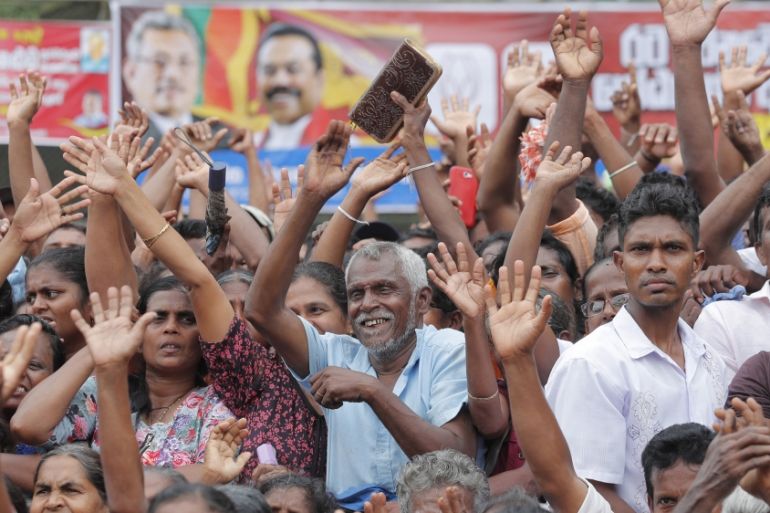
On November 16, Sri Lankans will go to the polls to elect a new president, a landmark vote as the island nation struggles with a sluggish economy, security challenges and increasing political polarisation.
Here is everything you need to know: who the candidates are, how the government works, and the implications of the possible outcomes.
Keep reading
list of 3 itemsA record 35 candidates vie for Sri Lanka’s presidency
President Maithripala Sirisena to not contest Sri Lanka polls
Who are the candidates?
This year’s election has a record 35 candidates running, from across the political spectrum.
Incumbent Maithripala Sirisena, elected in 2015, will not be seeking re-election, leaving the fight down to the two main candidates according to analysts: The ruling United National Party’s (UNP) Sajith Premadasa and Gotabaya Rajapaksa from the opposition Sri Lanka People’s Front (SLPP) party.
Gotabaya Rajapaksa – SLPP
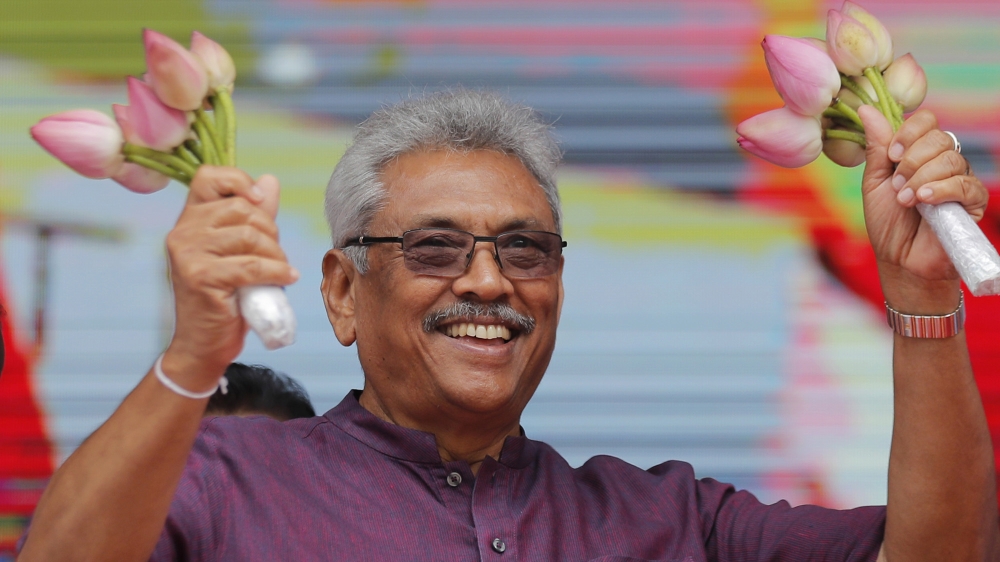
Gotabaya Rajapaksa, the brother of former Sri Lankan President Mahinda Rajapaksa and his former defence secretary, is the leader of the Sri Lanka People’s Front party. He is running on a platform promising to prioritise security and economic reform.
As defence secretary, Rajapaksa presided over the end of Sri Lanka’s 26-year civil war with Tamil rebels in 2009 and has been accused of being responsible for human rights violations committed at that time.
The SLPP is backed by Rajapaksa loyalists, including the outgoing president’s Sri Lanka Freedom Party (SLFP).
Rajapaksa is a divisive figure among minorities but has strong support among the island nation’s majority Sinhala Buddhist population.
Sajith Premadasa – UNP
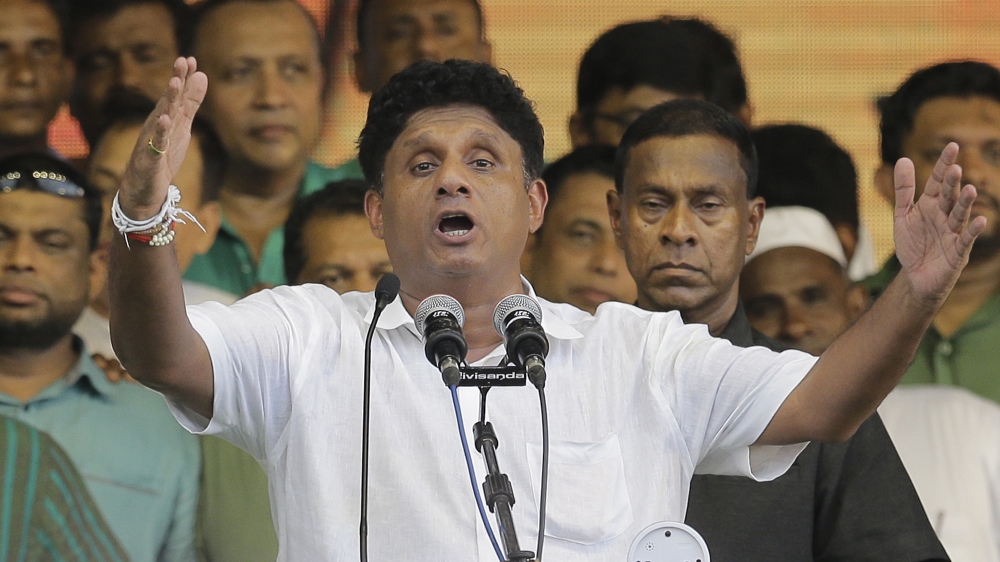
A cabinet minister in current Prime Minister Ranil Wickremesinghe’s government, Premadasa is backed by Sri Lanka’s ruling United National Party.
The son of a former president who was assassinated by Tamil rebels in 1993, Premadasa has been in and out of power since entering politics in 1994.
While he is backed by Wickremesinghe, the two have not always gotten along, including when it came to the question of Premadasa being fielded as the UNP-backed candidate in this election. Premadasa is standing as the candidate for the United National Front (UNF) alliance.
Premadasa is also promising economic reform and will be relying on support from Sri Lanka’s minority Tamil and Muslim populations to get him over the line against a strong Rajapaksa candidacy. The two minorities together form about 20 percent of Sri Lanka’s 21 million population.
Anura Kumara Dissanayake – Janatha Vimukthi Peramuna (JVP)
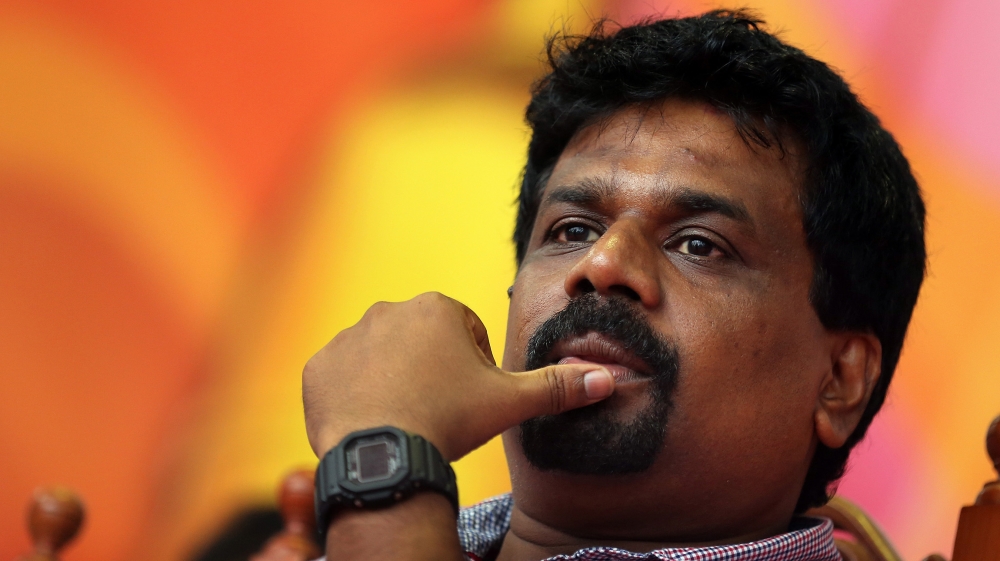
Anura Kumara Dissanayake leads the People’s Liberation Front (JVP) alliance, a leftist political movement that abandoned armed struggle against the government to join politics in 1994.
He is a member of the Parliament of Sri Lanka for Colombo and was chief opposition whip until December 2018.
Despite being in the opposition, Dissanayake became known for speaking out vehemently against the 2018 constitutional crisis which would have unseated Prime Minister Wickremesinghe.
Dissanayake is standing as the candidate backed by the National People’s Power (NPP) alliance.
Mahesh Senanayake – National People’s Party (NPP)
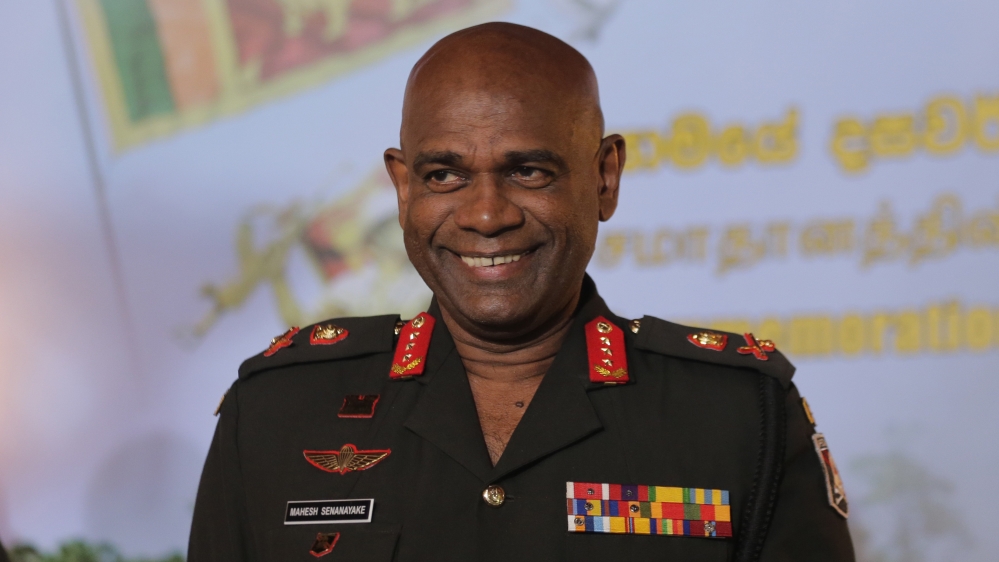
Sri Lanka’s recently retired army chief, Mahesh Senanayake, is seen by many as the candidate for the apolitical voter.
Senanayake retired in August 2019, having served in the military for 36 years, including through the civil war.
His career was not, however, without controversy: In 2010, he fled the country following a presidential election won by Mahinda Rajapaksa, fearing reprisals for having supported Rajapaksa’s opponent.
He returned in 2015 when Rajapaksa was defeated by Sirisena.
What are the key issues?
Security
On April 21, 2019, eight suicide bombers targeted three churches and three luxury hotels across Sri Lanka in a devastating series of attacks timed to coincide with Easter Sunday services. In all, 269 people were killed and more than 400 wounded.
The attacks appeared to take the Sri Lankan government by surprise, and a scathing parliamentary investigation report documented systematic failures at every level of the state’s security structure, including at the prime minister, president and intelligence chief levels.
In this election, voters will be concerned about addressing those issues and ensuring that such attacks do not recur. The blasts also prompted a series of counterattacks and riots targeting the island’s Muslim minority, mainly led by right-wing Sinhala Buddhist leaders, which has led to increasing polarisation in the country.
Economy
Burdened with high debt and sluggish economic growth, the Sri Lankan economy could not afford the hit it took following the Easter Sunday bombings.
Tourism numbers plummeted in the months that followed, after having already dropped during the constitutional crisis of 2018.
Whoever takes the helm will have to find a way to ensure growth while also servicing the country’s $34.4bn foreign debt. The current government’s handling of the economy has come under criticism from both the leading presidential candidates, although much of the debt was inherited from Rajapaksa’s government.
Fallout from the 2018 constitutional crisis
In October 2018, President Sirisena attempted to remove Prime Minister Wickremesinghe, from power and replace him with former President Mahinda Rajapaksa. The country’s top court reversed Sirisena’s decision, bringing back Wickremesinghe.
This presidential election will see Premadasa, the nominee for Wickremesinghe’s party, face off against Gotabaya Rajapaksa, Mahinda’s brother, for the slot of president.
If Rajapaksa wins, it would set up an immediate face-off with Parliament, which is led by the UNP, and a possible snap election.
Premadasa’s election, however, would not necessarily ensure stability, as the UNP leader also has serious differences with Prime Minister Wickremesinghe, and as president would wield significant power.
How does voting work?
The island nation has traditionally high rates of voter participation, with more than 15.9 million registered voters in a total population of 21.8 million, according to Election Commission statistics.
During the last presidential election in 2015, voter turnout out was 81.5 percent, the highest in the region.
Voting for Sri Lanka’s president is carried out through a modified “contingent vote” system, where voters mark both their first and second preference candidates when casting their ballots.
In the case of a runoff – if a single candidate fails to win more than 50 percent of the vote outright – the second preference votes will be added to the top two candidates’ tally to adjudicate a winner.
Voting will take place throughout the day on Saturday, November 16. If there is an outright winner, a result is expected by November 17.
If a runoff is required – which has never before happened in Sri Lanka – the results could take a day longer.
How is the government structured?
Sri Lanka’s government operates under a semi-presidential system, where the president holds widespread executive authority but governs in partnership with a prime minister he appoints and a cabinet recommended by the prime minister.
The president is directly elected for a five-year term, and can only be removed by a two-thirds vote in Parliament and with Supreme Court approval.
Parliament consists of a single-chamber house of 225 members, 196 of whom are elected in multi-seat constituencies and the remaining 29 by proportional representation from the results of the parliamentary election.
The prime minister and federal cabinet are drawn from Parliament. Under a recent constitutional amendment, the president no longer has the power to dismiss them and they are answerable solely to Parliament.
The same amendment also stripped the president of many powers – key among them the ability to hold ministries – which will apply to the office for the first time.